White Tri-Color LED Strip - Addressable, Sealed (1m)
These are sealed, addressable 1-meter-long 5V white tri-color LED strips that come packed with 60 SK6812 5050 LEDs. Each of these strips is enclosed by a flexible silicon jacket with an IP65 waterproof rating to protect your precious LEDs. Unlike our other addressable LED strips, this version does not feature RGB LEDs. Instead, you will be able to change each LED to provide a unique warm white, cool white, or amber combination. You will be able to control each LED individually, which gives you the ability to create cool lighting effects for your car, fish tank, or perhaps under-cabinet lighting in your kitchen!
These LED strips use a data transmission frequency of 800Kbps with their refresh rate set at 30 frames per second.
- Operating Voltage: 5VDC
- Watts per 60 LEDs/M: 14.4(max)W
- Entire Piece LED Quantity: 60 pcs
- 256 Level Gray Scale -- Adjustable
- Adhesive Backing
White Tri-Color LED Strip - Addressable, Sealed (1m) Product Help and Resources
WS2812 Breakout Hookup Guide
July 24, 2013
How to create a pixel string with the WS2812 and WS2812B addressable LEDs!
Core Skill: Programming
If a board needs code or communicates somehow, you're going to need to know how to program or interface with it. The programming skill is all about communication and code.
Skill Level: Rookie - You will need a better fundamental understand of what code is, and how it works. You will be using beginner-level software and development tools like Arduino. You will be dealing directly with code, but numerous examples and libraries are available. Sensors or shields will communicate with serial or TTL.
See all skill levels
Core Skill: Electrical Prototyping
If it requires power, you need to know how much, what all the pins do, and how to hook it up. You may need to reference datasheets, schematics, and know the ins and outs of electronics.
Skill Level: Competent - You will be required to reference a datasheet or schematic to know how to use a component. Your knowledge of a datasheet will only require basic features like power requirements, pinouts, or communications type. Also, you may need a power supply that?s greater than 12V or more than 1A worth of current.
See all skill levels
Comments
Looking for answers to technical questions?
We welcome your comments and suggestions below. However, if you are looking for solutions to technical questions please see our Technical Assistance page.
Customer Reviews
2.5 out of 5
Based on 2 ratings:
So disappointed
So disappointed This is my first bad experience with SparkFun. My strip have defective 7000K LED (others temperatures LED works fine)
They work but are white - orange, not RGB
Recommendations: 1: Recommend a fast level shifter. This one might be too slow: https://www.sparkfun.com/products/12009
2: Make it clearer that this is warm white, cool white or amber. Calling it white tri-color makes it sound like it is RGBW.
Both these issues cost me some troubleshooting time. I read lots about these LEDs in the process and somehow missed the description "warm white, cool white or amber".

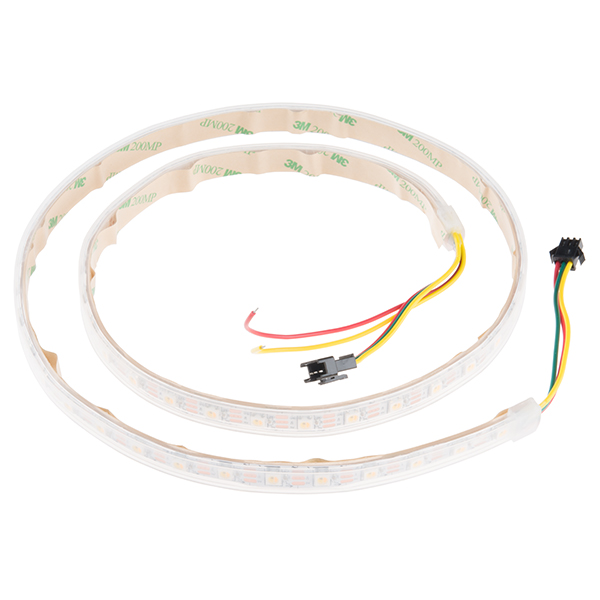
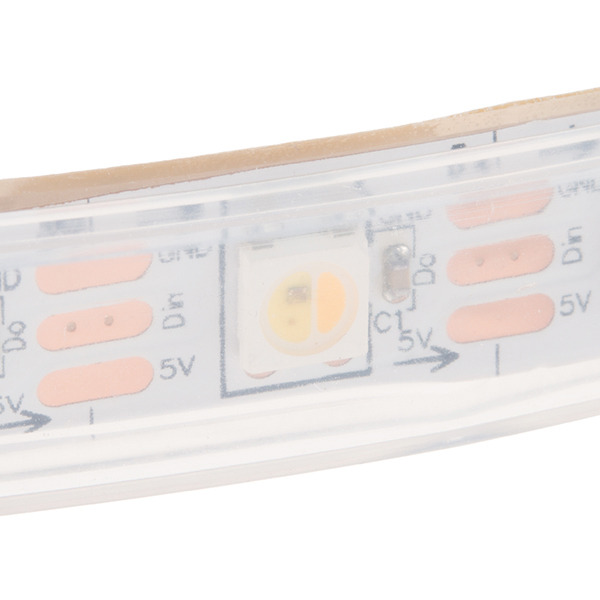
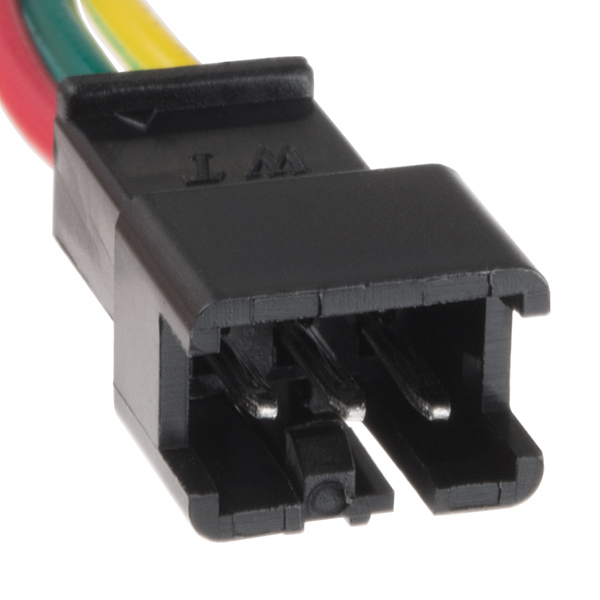
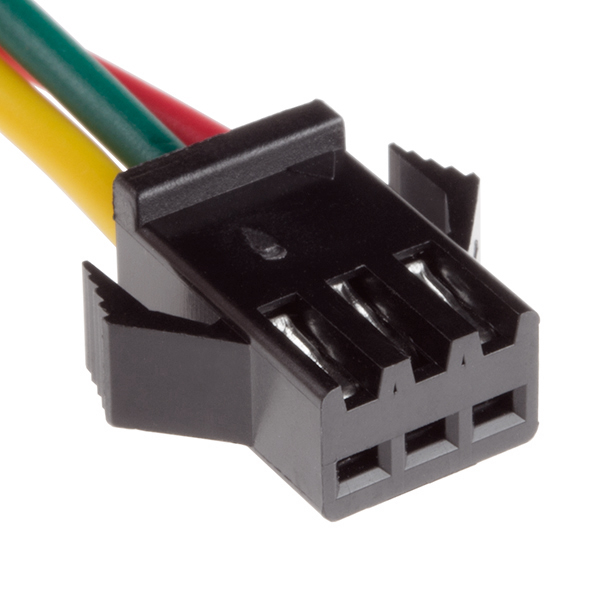
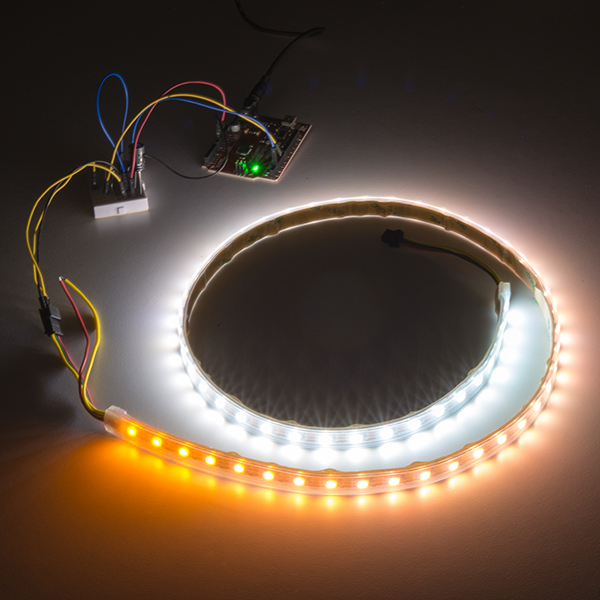
I recently purchased a water flow sensor that had this same connector and nobody could tell me what it was. I eventually found it and this was the Amazon description:
Hilitchi 520Pcs 2.5mm Pitch 2 3 4 5 Pin JST SM Male & Female Plug Housing and Male/female Pin Header Crimp Terminals Connector Kit
You will also need something similar to the following Sparkfun product:
Crimping Pliers - 28-20 AWG, TOL-13193
And some stranded wire.
I'm sorry if this was talking out of turn but I've found those connector kits to be very handy.
is there an arduino library available for this product? It doesn't seem to be compatible with neopixels.
Nevermind I tried it out. They do work with neopixels
Why? APA102 is a much better chip. easier to control, faster communication, better in every feature and costs approximately the same (if not cheaper)
Under-cabinet lighting idea. Setup motion sensors laid out alongside the strips. Program each sensor to control only certain sections of the strip. Normal lighting as amber, but under "activated" sensors have the strip white at a dial-configurable color temperature. Spot task lighting that follows you as you move side-to-side on the counter.
Awesome idea!
Is there an Arduino library that can deal with these strips being cool/warm/amber instead of RGB? Maybe FastLED could be extended/adapted? Would be super useful to be able to specify a color in degrees K and have the LEDs display it!
I'm one of the FastLED developers, and these lights look pretty interesting to me. One snag with the idea of a Kelvins-to-pixel-values here is that the datasheet provided here doesn't tell what the "color temperature" of the two different white LEDs are, so there'd be a little guessing going on there to estimate the native temperature of the cool and warm white. Maybe I'll grab one of these strips and see what I can come up with. (Development backlog is rather big right now, but RGBW and RGBWWW are in it, so this might be an interesting diversion.)
I was just looking at the datasheet (again) and noticed for the first time the color specifications... About mid-way down the 2nd page in small text to fit lots of characters in a small table cell I find the following information:
W:6000-7000K / WW:2700-3000K / Amber:1800-2000K
But I don't see any explicit mention of data order for communications. (I.E. how to map W, WW, and Amber onto RGB.) I guess figuring that out empirically is necessary.
As a work-around, why not use local variables "cool", "warm", and "amber" to pass into the SK6812 control function in the correct order? FWIW functions really don't care what you call the variables that you pass to them. And unless you are actually modifying/maintaining the function, why should us normal peons care what the function calls the values internally? C variable scope keeps one from interfering with the other.
Duh... I finished reading your comment... Sounds like a library that translates degrees K to pseudo RGB values and then passes the result to one of the existing SK6812 control libraries should be fairly trivial for someone who is versed in writing libraries.
Yep. Trying to imagine what rotating through the "hue" in a hue-saturation-value model that is expecting R-G-B LEDs would look like on these guys ... May just have to get some and try!
Are these dimmable?
how is this different from the LED RGB Strip-Addressable, Sealed (1m)?
This has two different temperatures of white LED and amber, not RGB.